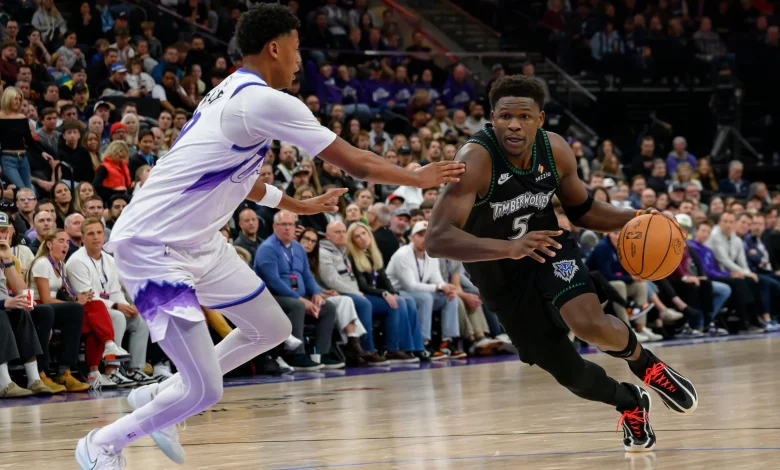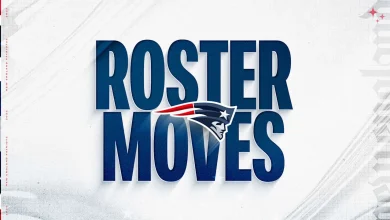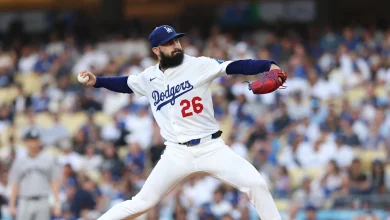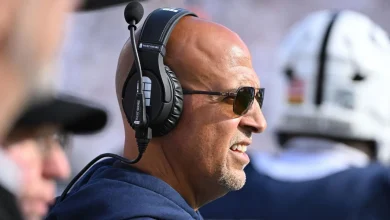Timberwolves pick up the pace, resuming role as an NBA offensive juggernaut

Set the clock and watch the feet.
If you want to know why the Minnesota Timberwolves are abruptly an offensive juggernaut, check out Bojangles Astaire, aka Anthony Edwards, as he do-si-dos his defensive dance partners into a menagerie of jilted embarrassments.
Peep the flutter-back fox trot, where Ant appears to engage his man, even as a fellow suitor slides in for a double-team, only to tilt away from the feint, in the backwards opposite direction, aided by the momentum of a harsh crossover dribble, setting the second foot for fadeaway liftoff. It’s a rapid-fire kiss-off requiring the core strength of a squirrel, especially from the three-point hinterlands, although Ant has minted an assortment of midranges into the flutter-back mix.
That sets up the polka for suckas, retracing the same dance sequence, except the flutter-back finale is a fake. The dance partner, smitten by the hard-to-get challenge posed by the step-back, cants his body forward with a vigor as vulnerable as a swoon. That’s when Ant waltzes into a polka with a wide sidestep and a forward burst, dribbling the ball like a yo-yo, swaying through traffic with the improbable aplomb of a stunt man in an action movie, until the plot thickens with a summit at the rim — banker, floater, slam-dunk, dish, or maybe hard contact and a holler for the foul.
Related: Timberwolves’ embarrassing regular season start scrambles expectations
The clock is nearly as important as the footwork. Ant hasn’t totally broken his career-long habits of bringing the ball up the court in a walk or slow-trot, surveying the scenery long enough for the defensive coverages to array, bunch and synchronize according to the prevailing scheme, and trying to force his way through thickets that ensnare — but he has significantly reduced them. And all of that saved time and more-rapid movement simplifies and improves the decision-making of Ant and his teammates by simultaneously creating more clear-cut options via cohesive rhythm and awareness.
Measuring “pace” in the NBA is a tricky endeavor. The benchmark is the number of possessions per game, but different contingencies are made for fouls (and the free throws they generate), turnovers and offensive rebounds that all have an impact on the number and length of possessions that are at odds with the overall “speed” of the game.
Even so, it is apparent that accelerated decision-making has enhanced the efficiency of the Wolves offense. Before the All-Star break of the 2024-25 season last year, Minnesota was 25th in pace and 14th in offensive rating (points scored per possession), with a record of 31-25. After the break, they were 21st in pace and third in offensive rating, propelling them to a record of 18-8. Thus far this season, they are 19th in pace and fourth in offensive rating, with a 7-4 record despite having the 18th rated defense (points allowed per possession) in the NBA.
The other dominant playmaker on the roster, Julius Randle, has often stated that an injury that cost him the entire month of February last season — sixth before the All Star break and four after it — enabled him to see how best to tailor his talents to boost the team.
Asked for specifics after a home game last month, he replied: “Just needed to be more decisive. Next-action basketball. Understanding my sweet spot; my teammates are doing a great job when I get double-teamed in the post, drawing space. But biggest thing is being quick and decisive and not holding the ball as much.”
The result was a higher true shooting percentage (which gives 3-pointers, 2-pointers and free throws their proper weight per attempt) and a better assist-to-turnover after the All Star break last season. But an even-larger leap has been taken thus far this season. From pre-break to post-break last season, on to the first 11 games thus far in the 2025-26 campaign, Randle’s true shooting percentage has hopped from 57.8% to 63% and up to 66.3% this season. And his assist-to-turnover ratio has also climbed, from 1.57 before last year’s All Star break to 1.82 after the break and now to 2.67 for the current season.
Obviously, turnovers hurt efficiency. Head coach Chris Finch likes to remind everybody that they happen most often “in a crowd,” meaning when the ball movement isn’t ahead of the traps and double teams deployed by the defense, or when players are dribbling into coverage rather than getting off the ball.
Quick decisions and deft footwork are handy tools for avoiding crowds. Because both Ant and Randle are efficient scorers on isolation plays, and Finch and the Wolves have chosen to rely on that skill more than leaning into a classic point guard for playmaking, the Wolves are never going to be a low-turnover team. But they are inexorably getting closer to the “sweet spot” cited by Randle, where the dimes and buckets rise a little more steadily than the miscues. In the five seasons where Finch has coached the team since training camp, the Wolves have finished 21st, 27th, 22nd, 18th in turnovers per game, and currently rank 14th in the 2025-26 season.
Better footwork, quicker decision-making and thus enhanced execution by the two players who lead the Wolves in usage (defined as direct engagement in the outcome of a possession) have ratified last year’s gains in offensive efficiency. But the cherry on top of the Wolves attack thus far this season is breakout performance by erstwhile defensive specialist Jaden McDaniels as a two-way force to be reckoned with around the NBA.
While the NBA’s Summer League was taking place in August of 2021, Finch sat in the luxurious aerie of his suite at the Wynn Hotel in Las Vegas, and made an audacious analogy on the brink of his first full season as coach of the team. At the time, McDaniels had just concluded his rookie season and was more than a month away from his 21st birthday. Nevertheless, Finch laid down a heavy marker on the future prospects of his young forward.
“I think—and this is obviously a stretch goal for anybody — but he can be Scottie Pippen-esque,” Finch said, comparing McDaniels to arguably the greatest second banana in NBA history.
“We talked about competing every time down; well he’s guarding Luka Doncic and guarding James Harden,” Finch continued. “These guys are phenomenal players and if they beat him one time, he is right back guarding them the next. I love the kid. He, to me, has such a great foundation. I think his ceiling is high. Very high.”
This season, the Pippen comp is still a pretty outlandish “stretch,” but no longer ridiculous. McDaniels has never had the opportunities to flex the way Pippen did on offense as the second option behind Michael Jordan and lead playmaker when MJ was off the court. In my annual preseason interviews with Finch, it has become somewhat of a running joke how many years he has invoked “getting Jaden more involved in the offense.”
Through it all, McDaniels has remained patient, pouncing on expanding his profile when injuries create a need for an underrated element in his skill set. When both Rudy Gobert and Randle went down last February, he became a frontcourt stalwart, switching off the center and power forward position with Naz Reid in a manner that showcased his rebounding and rim protection. And when Ant tweaked his hamstring during the third game of the season, McDaniels bore a chunk of the available offensive load that was tumbling down due to the superstar’s absence.
In the four full games that Ant was sidelined, McDaniels led the Wolves in minutes played and slid in beside Randle to sustain the double-dominant scorer approach Minnesota had informally adopted. He averaged 22.8 points per game on 64.3% shooting from the field (36-for-56), 66.7% from 3-point range (8-for-12) and 91.7% from the foul line (11-for-12). Compelled to guard the opponent’s top perimeter scorer in the absence of Ant and (for two games) Jaylen Clark, McDaniels still grabbed 4.3 rebounds and handed out 2.8 assists per game.
In the four games since Ant’s return, McDaniels has forced Finch and the Wolves to literally create more space for him in the context of the offense than existed before the injury. He’s averaged 18 points on shooting splits of 57.4% from the field, 69.2% on a higher volume of three-pointers, and 90% from the foul line.
Yes, it has only been 11 games, and the Wolves have had a very soft schedule — seven of those games have been played against defenses that rank in the bottom eight of the NBA in terms of points allowed per possession. And the point guard by committee situation still makes the team vulnerable to pressure defenses that pick up the ball-handler all 94-feet of the court. McDaniels needs teammates to shoulder the ball-security duties and will be diminished as much as anybody if they can’t.
Is McDaniels enjoying an extended boomlet of accuracy or is this a phenomenal step forward in his productivity? He certainly isn’t going to continue shooting 53.8% from 3-point range: Over his five previous full seasons, his career-best was 39.8% in 2022-23. But to the extent the Wolves continue to generate good spacing and efficiency, McDaniels will increasingly find his name near the top of the scouting report for opposing defenses.
The comparison to Pippen remains overblown, but Finch was right about the breadth and caliber of McDaniels’ role in winning basketball games. I once described his versatility as akin to a blank tile in a Scrabble game, and stand by it.
The presence of Gobert on the roster coupled with the suffocating team defense the Wolves were able to muster during their first of two trips to the Western Conference Finals has planted the idea that defensive excellence is the ongoing identity of this roster — and, by extension, this franchise.
But after the All Star break a year ago, the Wolves averaged 120.4 points per 100 possessions. Thus far this season, they are averaging 120 points per 100 possessions. That’s a combined 37 games of top 5 offensive efficiency.
As of Wednesday morning, the Wolves true shooting percentage of 62.4 led the NBA — and that’s with Ant missing four entire games, playing only 3 minutes in another, and being incredibly rusty in his first game back from injury.
The average accuracy on NBA three-pointers thus far this season is 35.8%. The Wolves have three players in the nine-man regular rotation shooting 50% or better — McDaniels, Ant and Mike Conley. Two others are shooting 40%, Randle and Jaylen Clark. Two others are above average — Donte DiVincenzo and Terrence Shannon Jr., at 36.4% apiece.
Will there be regression? Sure, from some folks, with Randle and McDaniels the primary candidates, based on past career performance. But Conley and DDV have been both more accurate on average over the past five years than their current numbers; Ant led the NBA in three-point makes, volume shooting at a 39.5% rate last season; and Naz Reid is shooting a career-worst 32.1% this season after exceeding or flirting with 40% accuracy from deep on high volume over the past two seasons.
Let’s wrap this up with the Wolves most recent performance, in Utah Monday night against the pathetic Jazz. Just 72 hours earlier, Minnesota led the same hapless opponent by 28 after one quarter and by 40 at the end of a thorough thrashing. In that interim, Utah had licked its wounds without a chance to get back on the court, while the Wolves were playing a back-to-back on the road.
It is the type of letdown trap game that has ambushed this Wolves franchise for many years with precious few exceptions. And after the first 20 minutes of action, it was happening again, as Utah was up by nine, 46 to 37.
The offense was stalled. Gobert had converted six of his seven shots. The rest of the team was 4-for-16 from 2-point range and 5-for-16 overall, with just three trips to the free throw line. Furthermore, the effort was lacking. The Jazz outrebounded the Wolves 29-17 in that span, with six different Utah players grabbing at least one offensive board.
Related: Wolves’ Coach Chris Finch on team’s young depth – know your role, keep it simple
But in the final 28 minutes of the game, the Wolves scored 83 points. Ant had 27 points, three rebounds and five assists. Randle had 27 too, along with eight rebounds and four assists. All in just one half plus four minutes of action.
Ant went dancing, Randle found his sweet spots and through the first eight and a half minutes of the third quarter, the Wolves outscored the Jazz 33-9. They finished with 40 points in the third, the fourth time in four games they had scored that many.
With Ant and Randle both resting, Utah steadily cut a 22-point third quarter deficit down to seven, 98-91, with 8:49 left to play. That’s when McDaniels went to work.
He took a dribble-handoff from Naz moving left toward the middle of the court along the arc, before suddenly veering right up the gut of the paint between two defenders while a third, seven-footer Yusuf Nurkic, awaited. Rather than finish the drive, McDaniels pulled up for one of his patented, “rocking chair” fadeaway floaters.
After a Utah miss, McDaniels came right down and challenged the defense again driving left from the top of the arc, drawing a foul on rookie Ace Bailey. He sank both free throws. Between those free-throw makes, Ant entered the game and 42 seconds of playing time late hit McDaniels in transition, speeding down the left side with Kyle Filipowski, an inch less than seven feet, in position to defend. But Jaden simply didn’t stop and used his body to shield his shooting hand while banking in the layup.
Just like that, the lead was back up to 13, courtesy of McDaniels’ personal six-point run. He finished his scoring for the night with an emphatic slam dunk over the fouling Filipowski, a 3-point play set up by another Ant feed, this one to the weakside corner that enabled McDaniels wide access to the baseline drive. The cool decision and aggressive flourish on the flush felt very “Pippen-esque.”





